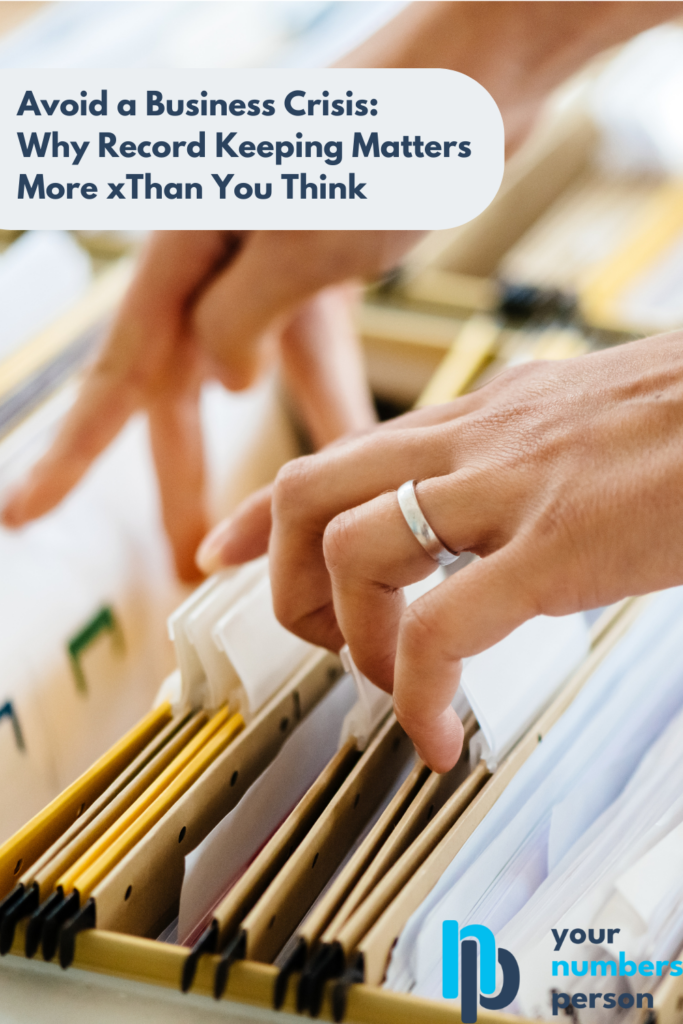Picture this: It’s tax season, and your accountant asks for a key financial document. You know you saved it somewhere… but where? You spend an hour digging through emails, folders, and random piles of paper. Frustrating, right?
Poor record-keeping often doesn’t feel like a problem until it suddenly is. Whether it’s tax season, a legal dispute, or simply managing day-to-day operations, having a reliable, easy-to-use system for your business records is essential. When you don’t have a solid system in place, it’s easy for documents to get lost, misplaced, or forgotten—putting you at risk of costly errors, missed opportunities, or even penalties.
The Biggest Record-Keeping Mistake Business Owners Make
Most business owners don’t lack good intentions, they lack a system.
You don’t need the fanciest accounting software or a color-coded filing cabinet. What you do need is a method that’s simple, reliable, and easy to maintain. This system should work for you, not the other way around. When a document is needed, you should be able to find it instantly, without the stress and headache of digging through countless files. Having an organized record-keeping system is more about consistency than complexity. It’s about creating habits that save you time and stress later on.
What Records Should You Prioritize?
Here are four key categories every business owner must keep in order:
Receipts
Don’t assume digital receipts will always be accessible in your inbox. Things get deleted, lost, or buried. The IRS requires receipts for purchases over $75, so set up a system to store them.
Quick tip: Use a tool like Dext to snap, store, and categorize receipts automatically.
Legal Agreements & Contracts
Once signed these often get forgotten, but they’re critical in case of disputes or audits. Keep all agreements, including:
- Partner agreements
- Vendor and client contracts
- Employee and contractor agreements
Registration & Compliance Documents
Ever needed your EIN letter, business license, or tax account details at the last minute? Losing access to these can cause serious headaches. Store them securely and ensure key personnel know where to find them.
Payroll Records
Accurate payroll records aren’t just for paying employees. They’re also necessary for tax compliance and audits. Keep detailed records, including pay stubs, tax forms, and employee classification details.
5 Steps to Effortless Record Keeping
Want to stop scrambling for documents and start feeling in control? Here’s how:
1. Choose a System (and Stick to It!)
Whether it’s Google Drive, Dropbox, QuickBooks, or a physical filing cabinet, pick a system that works for you—and use it consistently.
2. Organize Your Important Documents
Create clear folders for contracts, financial records, tax documents, and anything you need quick access to. Label everything to save time later.
3. Go Digital Wherever it Helps
Use tech tools to make record keeping painless. Automate receipts, store contracts in the cloud, and keep tax-related documents in one place. Tools like Dext, NordPass (for passwords), and QuickBooks Online can make this effortless.
4. Set Reminders for Routine Check-Ins
Block 10 minutes a week to scan receipts, save documents, and update records. A small habit now prevents major stress later.
5. Don’t Forget Passwords
Many business owners lose access to important accounts simply because they’ve forgotten their login credentials. Use a password manager like NordPass to securely store and manage your passwords, ensuring that you always have access to important accounts when you need them.
Need Help Getting Organized?
If your records are a mess (or non-existent), don’t panic. I help business owners set up smart, simple systems for financial records and bookkeeping, so you can focus on running your business.
Let’s make your bookkeeping stress-free. Book a quick call here to get started.

